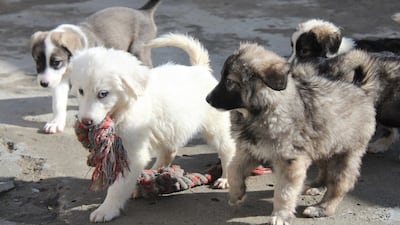A plane carrying very special cargo landed in Iceland this morning.
Flight AZS4001 from Ankara, Turkey, touched down in Keflavik at 5.17am on Tuesday.
Arriving six minutes ahead of schedule, the specially converted military jet had nearly 300 rescue cats and dogs from Afghanistan on board.
The flight is the second leg of an epic rescue journey that will end with a final flight to Vancouver International Airport set to depart Iceland on Tuesday evening.
Organised by Kabul Small Animal Rescue in partnership with the global animal rescue agency SPCA International, the flight had 158 dogs and 146 cats onboard. The next stage of the flight can be followed via a live link on flight tracking company FlightRadar24.
The journey is the culmination of nearly six months of work by rescuers in Afghanistan to try to get animals to safety after they were unable to do so during the mass evacuations in August, when the Taliban took control of the country.
Many of the rescue animals on the flight were pets abandoned by owners who were unable to take their dogs and cats with them as they fled.
Shelter founder Charlotte Maxwell-Jones posted a Facebook Live video of the plane getting set to leave Afghanistan on Monday morning, commenting that it was taxiing down the runway at “a bit of a desolate airfield”.
The jet has since landed in Turkey and flew onwards to Iceland for the second and final technical stop on the trip to Canada.
The aircraft making the rescue mission is a Russian Ilyushin 76-TD transport aircraft, designed for flying in extreme weather, so winter conditions in Iceland will not be likely to cause any problems for the onward journey.
Derick Stone from Kabul Small Animal Rescue and Jeff Berri, a volunteer from rescue agency No Dogs Left Behind, are onboard to help ensure the animals' safety. They are accompanied on the 86-tonne jet by two flight crews and three loadmasters.
Onboard, the animal's crates have been stacked back-to-back in carefully positioned rows that allow the volunteers to easily monitor them throughout the flight. Crates can also be easily moved for cleaning and to allow easy access for providing fresh food and water during the journey.
In order to ensure the animals are as comfortable as possible during the evacuation flight, the aircraft’s pressure has been optimised and the temperature on-board has been set to 21°C.
Among the dogs flying to safety are curly-tailed Bea and Max Zahera, who are under the care of No Dogs Left Behind and will head to Toronto once safely in Canada.
Rescuers worked closely with National Air Cargo, who helped detail the flight plan, and coordinated with regulatory bodies in all the countries that the jet has to land in.
It's the second attempt that Kabul Small Animal Rescue has made to try to get animals in their care out of Afghanistan.
In August, during mass evacuations, Maxwell-Jones travelled to the airport with some of the centre's rescue dogs. After waiting for days with the animals held in cages, she was unable to secure a flight and was told to release the dogs.
Thankfully, it now seems like it's second time lucky for many of these animals because of the agency's ongoing efforts, support from SPCA International and several other animal welfare organisations.
Once the animals land in Canada, they’ll be transferred to a specially constructed 1,600-square-metre facility at Vancouver International Airport. Efforts will be made to reunite pets with their owners.
A live Facebook feed of the dogs being unloaded should be available on SPCA International’s page and anyone interested in rehoming one of the animals can apply to adopt here.
The successful relocation of Max, Bea and their 283 four-legged companions isn’t the end of the line for Kabul Small Animal Rescue Agency, which continues to work in Afghanistan.
Maxwell-Jones and her team are hopeful that the many animals still under their care that were too young or sick to go on this flight will be transported for rehoming outside Afghanistan on future commercial flights.


